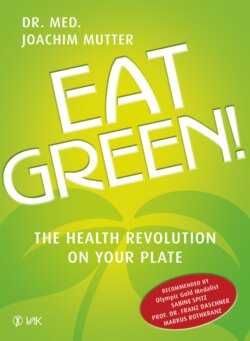Читать книгу Eat Green! - Joachim Dr. med. Mutter - Страница 11
На сайте Литреса книга снята с продажи.
Are organic foods healthier?
ОглавлениеOn average, a person consumes about 30 tons of food and 50 tons of beverages in a lifetime. With this, we probably also ingest many pounds of harmful substances. Many of the toxins that we can detect in our body tissues originate from our food. Here we can very successfully intervene: it has been extensively proven that organically cultivated food contains significantly fewer toxins than conventional nutrition.
The reason: organic cultivation prohibits the use of artificial chemicals such as insecticides (kills insects), fungicides (kills fungus), herbicides (kills weeds), phosphate fertilizer (contains extremely toxic uranium) and artificial nitrogen fertilizer (contains poisonous cadmium). Gene manipulated vegetable foods (GMO) that are of very high risk to the health are also banned in organic farming. The quality of the soil is also significantly higher due to the amount of the humus producing earthworms and microorganisms that live within the earth. Organic farming also ensures that our drinking water is less polluted by residues of phosphate fertilizer and pesticides.
Next to their relatively low level of pollution, organic foods also present with an increased amount of health-promoting micronutrients. This is because the plants have to defend themselves against insects and pathogens (such as plant fungi) due to the absence of pesticides. They have to defend themselves as the chemicals aren’t doing it for them. And these vegetable antibodies that are predominantly formed in organic foods are very beneficial to our health. As an example, you can take a large group of polyphenols that activate our “longevity genes” (sirtuin-genes) and in animal testing proved to increase the healthy lifespan by up to 150 %. The cancer-destroying salvestrols are also found in organic foods in higher amounts. The positive effects of real organic nutrition are only surpassed by products of permaculture and wild harvesting. It should be noted, however, that food that is given the organic certification of the European Union does not have the same high quality as those of renowned organic farming associations such as Naturland, Bioland or Demeter.
© Pixelio.de / brit berlin
People often argue that the world population cannot be fed by organic food alone. A study published by the University of Michigan under the co-direction of Catherine Badgely in 2007 showed that after a worldwide switch to organic farming, the organically produced foods would have about 75 % more calories. The result would be an amount of food that could theoretically feed a world population of 12 billion people.5
